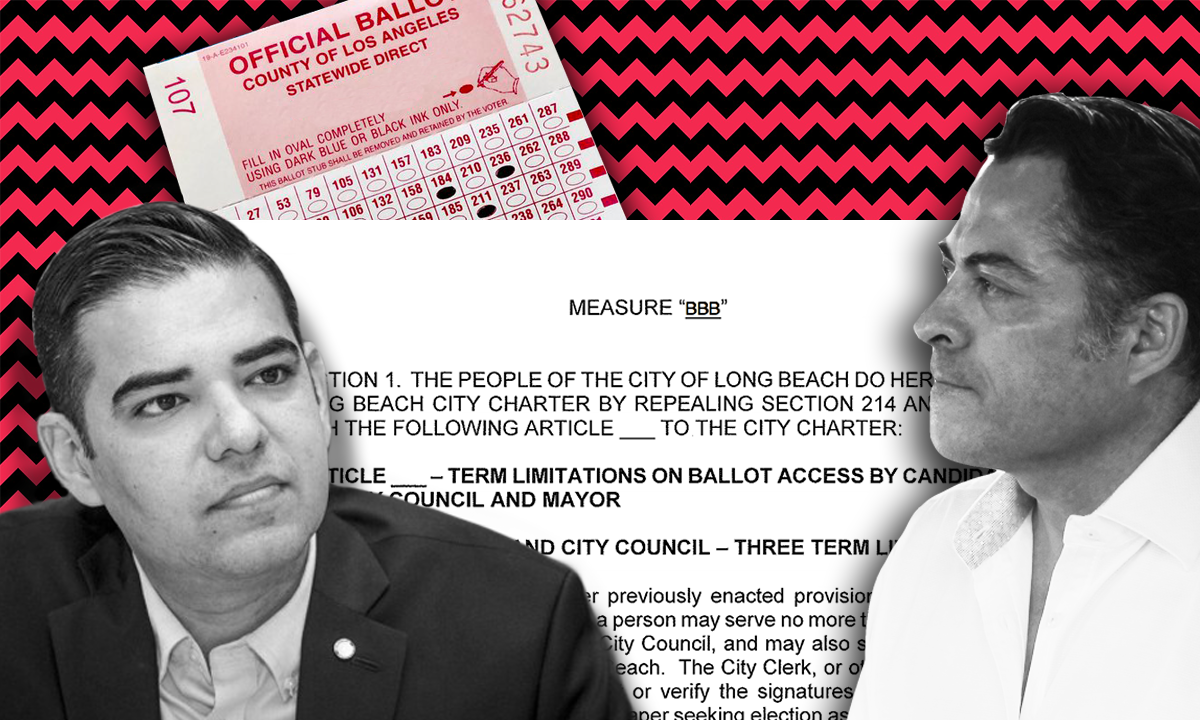Problems with Both Sides of the BBB Debate
With misinformation on one side and a conflict of interest on the other, what’s a Long Beach voter to do?
8 minute readEditors’ Note: Perspective pieces do not necessarily reflect the views of FORTHE Media.
There’s a legitimate argument against Measure BBB, but it’s definitely not to be found in the misinformation many BBB opponents are spreading.
“This City Charter amendment does NOT LIMIT, but instead INCREASES, term limits,” say the authors of the anti-BBB argument in the sample ballot. “It extends our current limit of TWO TERMS (eight years) TO THREE TERMS.”
The argument is amplified by the Long Beach Reform Coalition, a local PAC including members who recently found themselves on the wrong side of a court ruling concerning “incorrect and misleading statements” made in their ballot arguments against Measures AAA and DDD. “Please be aware,” they say, “that our City Attorney, handmaiden to the mayor’s network of big money special interests, has purposefully worded the description of Measure BBB on the ballot (known as the ‘Title & Summary’) so as to mislead the voters of Long Beach into thinking that they are in fact introducing term limits by voting yes! Nothing could be further from the truth! Measure BBB extends the current two-term limit to three terms […].”
This is, quite simply, nonsense. At present, Long Beach has no term limits.1 The only limitation is that candidates who have served two terms in office cannot be listed as running for a third on primary election ballots, but rather must win the primary as a write-in before moving on to either a run-off or the general election (where they would be listed on the ballot)—a process they can go through as many times as they wish. If passed, BBB will limit mayors and city councilmembers in Long Beach to a maximum of three full terms, regardless of how they got into office.
To make the false claim that term limits already exist, not only do BBB opponents have to ignore Article II, Sec. 214(b) of the Long Beach Charter (“[…] nor shall any provision of this article be construed as prohibiting any person from standing or campaigning for any elective office by means of a write-in campaign”), but they also ignore the very existence of current 6th District Councilmember Dee Andrews, who is more than halfway through his third term.
Nonetheless, those facts didn’t stop a group that may or may not be named “LB4D”2 from sending out an email blast with a headline claiming “City Manager Pat West memo confirms that BBB will change the current two term limit to three terms,” followed by a quote taken from that memo to the mayor and councilmembers (reprinted below exactly as written):
“If Measure BBB fails, the current Charter provision will remain in effect. The Mayor and City Councilmembers will have a two-term limit…”
It’s a real memo, and that’s a real quote … except in place of the ellipsis the rest of it goes like this: “and may serve an unlimited number of terms as a write-in candidate.” Which means the person(s) behind “LB4D” are simply lying to make their anti-BBB case by intentionally misrepresenting West’s quote. (Click on the blog link and you get to see the lie repeated multiple times, among other dubious assertions.)
Similar dubiousness is on display at OpenUpLongBeach.com, which was founded by former Long Beach councilmember Gerrie Schipske and calls itself “a general purpose local political action committee (PAC) which helps voters elect candidates who reflect the values of an open, transparent and accessible local government.” Recently they claim to have “discovered a bombshell about Measure BBB”: that it would give current officeholders 12 more years than they have already served. To make this claim is to ignore BBB’s central, explicit provision that no person who has served three terms may be appointed to serve an additional term.3 On Oct. 8, City Attorney Charles Parkin issued a statement confirming this: “[A]ny former or current Mayor or Council member who has served two full terms as a non-write-in candidate would be eligible to run for and be elected to only one additional term if Measure BBB passes.”
Tomisin Oluwole
Fragmented Reflection I, 2021
Acrylic on canvas panel
24 x 30 inches
Click here to check out our interview with Tomisin Oluwole, a literary and visual artist based in Long Beach.

Instead of gunking up our site with ads, we use this space to display and promote the work of local artists.
If you want a legit argument against BBB, look toward the conflict of interest inherent to its formulation. BBB was placed on the ballot by the city council, and as written it gives Mayor Robert Garcia—who co-authored the pro-BBB argument in the sample ballot4—and every current councilmember except Andrews an easier path to winning a third term than they would have without it.5
Let’s use Garcia as our example, who won a second term as mayor in April. In a BBB-less world, if he wants a third term, he has to win a primary as a write-in before moving on to the general election—a process he can avail himself of for the rest of his life. On the other hand, if BBB becomes law, he can be listed as a candidate in one more primary election—but if he wins and serves a third term, he’s done forever as mayor.
At a glance this may seem to limit his ability to hold on to power, and in one sense of course that’s true: three terms is fewer than an unlimited number. But here are two bits of Civics 101 for ya: As a general rule, incumbents have the advantage over challengers, and listed candidates have the advantage over write-ins. So BBB would make it easier for Garcia to win that third term in 2022.
And now we have our conflict of interest. The city council could have asked the city attorney to craft BBB so that it denies current officeholders the possibility of enjoying the advantages of running for a third term as a listed primary candidate by including a provision along the lines of, “No person who was elected to office prior to November 6, 2018, shall be eligible to be listed as a candidate for a third term in such office in any Municipal Primary Election.” But no such request was made.
It is unclear whether the city attorney would or could have honored such a request. According to Deputy City Attorney Amy Webber, Government Code section 36502(b) prohibits this with its “require[ment for] a term limit to operate prospectively only,” and therefore “listing or prohibiting the listing of certain candidates would not be consistent with the Government Code section.” However, this section explicitly concerns only the term limits themselves and candidate eligibility for office, with no mention of candidate listings on ballots; and in Long Beach (i.e., without BBB on the books) we already have precedent (e.g., Dee Andrews in 2016) for candidate eligibility for office being separate for eligibility to be listed on a primary ballot. When asked to clarify on this point, Webber said only, ”The purpose of the proposed amendment is to eliminate the current loophole in the term limit Charter provision for write-in candidates. Going forward, if the measure is approved, there will be no distinction between formally nominated and write-in candidates.”
Part of the reason I chose Garcia for my example is because I like him both personally and as mayor; and, barring scandal, I expect he would have no problem winning in 2022 as a write-in. Heck, I’d probably be one of those votes. So BBB wouldn’t change anything in his case vis-à-vis a third term, and the idea of his serving a third term doesn’t bother me one bit.
But my feelings and Garcia’s competence are beside the point, as is whether Garcia or any of the councilmembers would need BBB to win a third term. The point is whether it is appropriate for government officials to attempt to change the rules in ways that extend or enhance their own power, finances, etc. When they do, that is a conflict of interest. Whether or not BBB is good for the city in the long run, clearly it provides the people who put it on the ballot with a short-term electoral advantage they would not otherwise enjoy: an easier path to a third term.
There is no question that the “No on BBB” argument in the sample ballot and commonly proliferated on social media is bogus. BBB does not lengthen the potential amount of time mayors and councilmembers can serve: it imposes limits where currently none exists.
But BBB is crafted in a way that violates what for me is a basic tenet of good government, in that it gives a near-term electoral advantage to the officeholders who authored it. I don’t know whether that is enough reason to vote No, but for me it’s enough reason not to vote Yes.


 greggory.moore@gmail.com
greggory.moore@gmail.com




